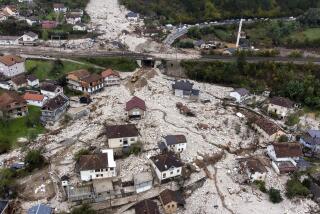Both Sides in Yugoslavia Delay Peacekeepers, Vance Charges : Conflict: The U.N. envoy deplores the lack of progress in removing federal troops from barracks in Croatia.
- Share via
BELGRADE, Yugoslavia — United Nations envoy Cyrus R. Vance arrived here Sunday on a mission aimed at restoring peace in Yugoslavia, but he accused both Croatia and the Serbian-commanded federal army of delaying any deployment of U.N. peacekeepers.
Fighting has continued around the Croatian city of Osijek, and some federal army units remain blocked inside their barracks by Croatian national guardsmen, Vance complained.
“I am distressed that more progress has not been made in de-blocking the barracks and in moving those troops out of Croatia,” he told reporters upon arrival in Belgrade, which is both the Serbian and federal capital.
“More progress has to be made than has been made at this point” to make way for U.N. blue-helmeted peacekeepers to move in and separate the combatants, he said.
U.N. officials have said they will send in peacekeepers only if a cease-fire negotiated by Vance and European Community diplomats last week takes hold long enough for the foreign forces to take up positions in the trouble spots.
Some easing of the crisis has occurred over the last week as the 14th truce declared in the five-month-old civil war has significantly reduced clashes. Also, Croatian President Franjo Tudjman has agreed to let U.N. forces deploy within his republic, dropping his earlier insistence that the foreign troops patrol Croatia’s prewar borders.
The Serbian-commanded federal army has seized about one-third of the Croatian republic in what it has presented to the world as an action to protect the 600,000-strong Serbian minority in Croatia. Croats contend that the army is trying to prevent their republic from gaining independence and is undermining the Yugoslav federation, which has spent most of its budget to support the army.
Vance will meet this week with leaders of Serbia, Croatia and the federal army to determine whether they are truly committed to allowing U.N. intervention. The meetings will also focus on developing a strategy for when and where to position the U.N. troops should the shaky cease-fire finally take hold.
Croatia and the Serbian forces remain deeply divided over the details of a U.N. deployment. The army is calling for peacekeepers along the current battlefronts, which would serve to protect Serbian territorial gains. Croatia insists that the army eventually be forced out and that prewar borders be protected against renewed federal or Serbian incursions.
In a move further threatening chances for a successful deployment, political leaders in the Serbian-held Krajina region of Croatia said they will not allow U.N. forces to enter their territory.
Vance is said to favor a scattered deployment, with U.N. troops moving into areas that have been the scenes of fighting but not forming an impenetrable buffer zone. That plan requires complete demilitarization of the area, however, a task thought to be impossible because huge numbers of civilians and local reservists possess guns. It could also expose the clustered peacekeepers to strikes by extremists from either side.
The United Nations took up the cause of trying to bring peace to Croatia after 13 previous attempts by the European Community failed.
Some observers believe that both sides have been worn down by five months of battle that has cost at least 7,000 lives. But others worry that the federal and Serbian forces, their appetites whetted by successive territorial gains, are using the U.N. diplomacy as a chance to regroup before launching another campaign to take Osijek and key ports on the Adriatic coast.
Croatia has accused the Serbian-led army of stepping up attacks over the weekend, and Serbian media claim that Croats have made retaliatory strikes in areas already conquered by the army and occupied by Serbs.
Defense Ministry officials in the Croatian capital of Zagreb reported sporadic shelling around Osijek, a key city of 140,000 where at least five people were killed Saturday.
Because Osijek is the administrative center of oil-rich eastern Croatia, Croats fear the army plans to conquer the city before allowing U.N. forces to deploy.
Serbian television and the Tanjug news agency claimed that Croatian forces shelled the city of Beli Manastir, a Serbian-occupied region of eastern Croatia.
In Germany, meanwhile, state radio quoted German Foreign Minister Hans-Dietrich Genscher on Sunday as saying that his country would recognize Croatia and Slovenia, another breakaway Yugoslav republic, as independent states later this month.
More to Read
Sign up for Essential California
The most important California stories and recommendations in your inbox every morning.
You may occasionally receive promotional content from the Los Angeles Times.











